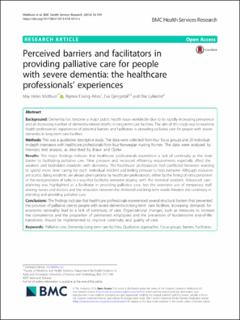Perceived barriers and facilitators in providing palliative care for people with severe dementia : the healthcare professionals' experiences
Peer reviewed, Journal article
Published version

Åpne
Permanent lenke
https://hdl.handle.net/11250/3026971Utgivelsesdato
2018Metadata
Vis full innførselSamlinger
- Artikler [407]
- Publikasjoner fra Cristin [424]
Sammendrag
Background
Dementia has become a major public health issue worldwide due to its rapidly increasing prevalence and an increasing number of dementia-related deaths in long-term care facilities. The aim of this study was to examine health professionals’ experiences of potential barriers and facilitators in providing palliative care for people with severe dementia in long-term care facilities.
Methods
This was a qualitative descriptive study. The data were collected from four focus groups and 20 individual in-depth interviews with healthcare professionals from four Norwegian nursing homes. The data were analysed by thematic text analysis, as described by Braun and Clarke.
Results
The major findings indicate that healthcare professionals experience a lack of continuity as the main barrier to facilitating palliative care. Time pressure and increased efficiency requirements especially affect the weakest and bedridden residents with dementia. The healthcare professionals feel conflicted between wanting to spend more time caring for each individual resident and feeling pressure to help everyone. Although resources are scarce, dying residents are always given priority by healthcare professionals, either by the hiring of extra personnel or the reorganization of tasks in a way that facilitates someone staying with the terminal resident. Advanced care planning was highlighted as a facilitator in providing palliative care, but the extensive use of temporary staff among nurses and doctors and the relocation between the sheltered and long-term wards threaten the continuity in planning and providing palliative care.
Conclusions
The findings indicate that healthcare professionals experienced several structural barriers that prevented the provision of palliative care to people with severe dementia in long-term care facilities. Increasing demands for economic rationality lead to a lack of continuity of care. Organizational changes, such as measures to increase the competence and the proportion of permanent employees and the prevention of burdensome end-of-life transitions, should be implemented to improve continuity and quality of care.
